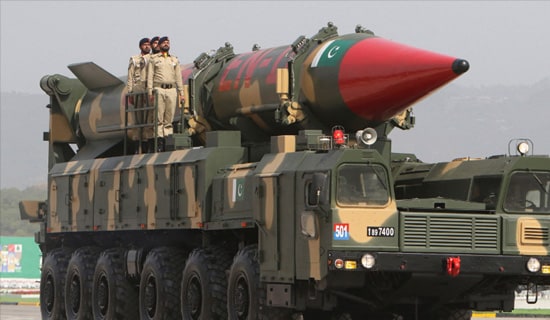The following are some of this week's reports from the MEMRI Jihad and Terrorism Threat Monitor (JTTM) Project, which translates and analyzes content from sources monitored around the clock, among them the most important jihadi websites and blogs. (To view these reports in full, you must be a paying member of the JTTM; for membership information, send an email to [email protected] with "Membership" in the subject line.)
Note to media and government: For a full copy of these reports, send an email with the title of the report in the subject line to [email protected] . Please include your name, title, and organization in your email.
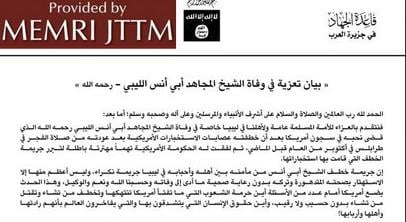
On January 8, 2015, Al-Qaeda in the Arabian Peninsula (AQAP) released a statement mourning the death of Abu Anas Al-Libi, who died last week in a New York hospital. AQAP sent its condolences to Muslims, especially Libyans, and called upon them to avenge Al-Libi's death.
The following report is a complimentary offering from MEMRI's Jihad and Terrorism Threat Monitor (JTTM). For JTTM subscription information, click here.

The day after the deadly shooting at the headquarters of the Charlie Hebdo weekly in Paris, jihad supporters on social media continued to glorify the perpetrators of the attack. In particular, activists of Al-Qaeda in the Arabian Peninsula (AQAP) boasted that the shooters were members of their organization (though AQAP has not officially claimed responsibility for it) and distributed images, banners and videos in praise of the shooting. They emphasized the role of AQAP and of its English-language magazine Inspire in encouraging lone wolf attackers, mentioning that Inspire had published a "wanted poster" featuring the editor of Charlie Hebdo, St├®phane Charbonnier, who was killed in yesterday's shooting. Others posted quotes by Osama bin Laden, calling for acting against those who insult the Prophet, and also referred to various "crimes" committed by France, such as its invasion of Mali.
The following report is a complimentary offering from MEMRI's Jihad and Terrorism Threat Monitor (JTTM). For JTTM subscription information, click here.

French- and English-speaking jihad fighters and their wives, mostly Islamic State (ISIS) members based in Syria and Iraq, were ecstatic at the January 7, 2015 Charlie Hebdo attack in Paris. Following is a review of notable reactions. The French-speaking Jihadi fighters reacted joyously at the news of the attack and its revenge for the blasphemous acts of the cartoonists, and called for more attacks against the West. They also criticized and leveled accusations against Muslims in the West for their reactions of support for the victims of the attack. Few tweets mentioned the doubt about whether Al-Qaeda or ISIS was behind the attack; the focus was on praising the attack as revenge for Islam in general.
EXCLUSIVE: Changing Dynamics In The Global Jihad Movement (2): Jihadis In Yemen Torn Over ISIS
Introduction

Logo of "ISIS-Yemen Province" media office (image: Alplatformmedia.com, December 17, 2014)
In recent months, tensions have been rising within the jihadi movement in Yemen between supporters of Al-Qaeda and supporters of the Islamic State. Beginning some 18 months ago with the announcement of the establishment of the Islamic State of Iraq and Syria (ISIS) in April 2013, the tension peaked recently when, in November 2014, a Yemeni jihadi group swore loyalty to ISIS leader Abu Bakr Al-Baghdadi, as part of a joint move by jihadi groups in a number of countries.
Al-Baghdadi expressed his satisfaction with the Yemeni group's oath of loyalty, and in a speech stated that he accepted it and declared Yemen a new province in the Islamic Caliphate.
It should be noted that ISIS, which sees itself as the legitimate leadership of all Muslims, seeks to expand beyond the areas of Iraq and Syria that it currently controls; accordingly, its leaders have stated that its declaration of the Islamic Caliphate renders all jihad groups worldwide illegitimate and that these groups must therefore swear fealty to the new caliphate.
Until recently, the leaders of Al-Qaeda in the Arabian Peninsula (AQAP), which covers Yemen, were careful to respect ISIS and refrained from publicly criticizing either it or its leader Al-Baghdadi's declaring himself leader of all Muslims worldwide - in contrast to Al-Qaeda Central, which explicitly renounced ISIS. Moreover, following the establishment of the U.S.-led international coalition to fight ISIS, AQAP leaders expressed sympathy with this organization, and called on Muslims around the world to attack Western targets in retaliation for coalition airstrikes in Iraq and Syria and in order to deter future attacks. They even defended ISIS fighters against clerics' and jihadi organizations' accusations that they were extremists and Kharijites, stating that they were faithful mujahideen.
However, it appears that ISIS's penetration into Yemen, as expressed by the Yemeni mujahideen's oath of fealty and Al-Baghdadi's declaration, threatens the leaders of AQAP, as it challenges both their leadership and their group's status as the spearhead of Yemeni jihad. In the wake of the declaration, AQAP publicly criticized ISIS, rejected Al-Baghdadi's legitimacy as the leader of all Muslims, and reiterated its allegiance to Al-Qaeda.
The sixth issue of the Islamic State's (ISIS's) English-language magazine Dabiq, released on December 29, 2014, focuses on denouncing the Al-Qaeda organization and its leader Ayman Al-Zawahiri. The issue's feature article, titled "Al-Qa'idah of Waziristan: A Testimony from Within," is authored by Al-Qaeda defector Abu Jarir ash-Shamali, who recounts his experiences in Waziristan following bin Laden's death in 2011 and speaks of his disillusionment with Al-Qaeda which eventually led him to leave it and join ISIS instead.
Directing harsh criticism at Al-Qaeda under bin Laden's successor, Ayman Al-Zawahiri, Ash-Shamali states that, when he came to Waziristan in 2011, he found that Al-Qaeda did not really control the region or enforce the shari'a there, but was preoccupied with screening mujahideen and letting only yes-men advance in the organization's hierarchy. Al-Qaeda, he says, operated like a "secret society" and an "impenetrable class system," ostracizing anyone who dared to criticize it or think differently. He also accuses Al-Qaeda and its leader of abandoning the path of jihad and adopting a "pacifist" approach, for example by supporting the popular protests of the Arab Spring and by refusing to condemn Iran and proclaim the Shi'ites infidels. To demonstrate Al-Qaeda's corruption, he recounts at length an incident where sons of top Al-Qaeda officials were involved in "sodomy" (homosexuality) and espionage, but the organization refused to punish them, persecuting instead the Al-Qaeda members and officials who tried to bring them to trial.
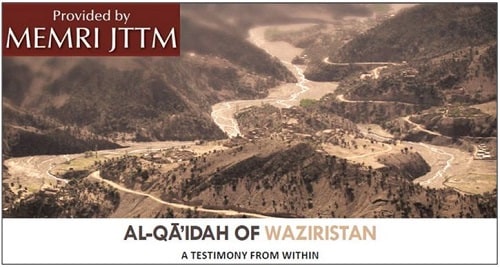
SUPPORT OUR WORK

Ash-Shamali recounts that, when ISIS emerged and Al-Qaeda members began showing an interest in it, the organization first tried to buy their loyalty by offering them jobs and money, and when it failed, began to persecute them and their families, and tried to recruit various forces and organizations to fight them. He accuses Al-Qaeda of plotting with Jabhat Al-Nusra to exclude ISIS from the Syrian arena, and even of plotting with a Kurdish organization to fight against ISIS in Iraq. But eventually, all of Al-Qaeda's efforts to undermine ISIS were in vain, he concludes.
According to his claims in the article, Ash-Shamali spent eight years in an Iranian prison (in 2002-2010) and was a close acquaintance of Abu Mus'ab Al-Zarqawi, the late leader of Al-Qaeda in Iraq, of whom he speaks very highly in the first part of the article. Below are excerpts from the second part, in which he recounts his experiences in Waziristan.
Urdu Daily: ISIS Threat Posted In Bathroom Of Mumbai Airport Warns Of Attack
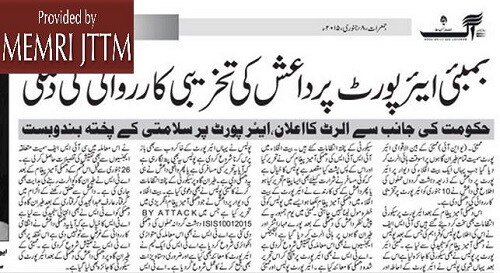
A screen grab of the report in Roznama Aag
According to an Urdu-language daily, a threat posted in the name of the Islamic State of Iraq and Syria (ISIS) in a bathroom of a Mumbai airport has caused a serious security issue, leading to Indian authorities enhancing security measures at all airports including the Mumbai International Airport.

On January 6, 2015, the information office of the Islamic State (ISIS) in Al-Kheir province (formerly Deir Al-Zor) released a four minute video titled "Message From Muslims To The Family Of the Pilot." The video features four people, including a young boy, who direct various messages to the family of Mu'adh Safi Yusuf al-Kasasibah, the Jordanian pilot who was captured by ISIS on December 24, 2014, while flying a mission for the anti-ISIS coalition. The individuals refute claims that Mu'adh was a Muslim who deserved to be treated well by ISIS, saying, inter alia, that he went on his mission willingly, and participated in bombing Muslims. Therefore, they say that Mu'adh is an apostate and an unbeliever who must be killed for his crimes. In that regard, the individuals suggest various ways to kill Mu'adh. One person says that he should be tortured prior to his killing, while the young boy says that Mu'adh should be slaughtered.

Senior Saudi officer killed in the attack (right); Iraqi-Saudi border fence (left)
On January 5, 2015, Alarabiya.net reported that a terrorist cell that infiltrated from Iraq had carried out an attack inside Saudi Arabia at the Jadida-'Ar'ar border crossing. According to the report, the four-man cell first attacked the crossing on the Iraqi side, and then infiltrated into Saudi Arabia. A Saudi border patrol force confronted and killed the terrorists. During the firefight, one of the terrorists blew himself up with his explosive vest, killing Major-General 'Awad bin 'Eid Al-Balawi, the head of the Saudi Border Guard in the Northern District, along with another soldier, and wounding several other soldiers and officers.
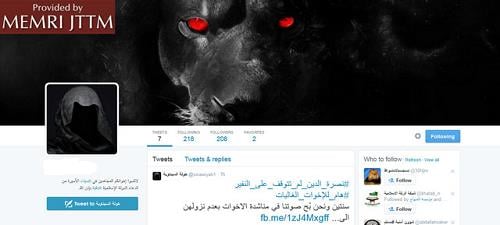
On January 4, 2014, Khawla Al-Sinawiyya, a female member of the Jihadi Media Platform forum posted a link to a video that showed the breaching of a large number of Facebook pages that apparently belonged to Egyptian armed forces personnel, whom the video referred to as apostates. According to the video, hackers managed to gain access to the computers and mobile phones of their targets, obtaining valuable information in the process, including their workplaces and whereabouts. The video said that such information was useful for the mujahideen, whom it referred to as "our brothers."

A pro-Islamic State (ISIS) hacker entity, Cyber Caliphate, has recently taken responsibility for an attack against "the U.S. Official Network Communications," from which the group claims to have obtained confidential information about a large number of residents of Albuquerque, New Mexico.
In an announcement, which the group posted on pastebin.com on December 29, 2014, the group said that the attack was in response to the U.S. bombing of the Islamic State and promised "no mercy" towards the "infidels." The group also promised to expand its attacks to other states besides New Mexico.
ISIS: 'We Exposed A Cell Planning Armed Rebellion Against The Caliphate State'

On December 21, 2014, the information office of the Islamic State (ISIS) in Al-Raqqa province in Syria released a video titled "Capturing Zealot Cell that Planned to Rebel Against the Caliphate State." It should be mentioned that despite the claim that this cell attempted a rebellion against the caliphate, it is unclear from the video whether this was a plot that endangered ISIS or a marginal gang.
Video Shows Two Italian Women Aid Workers Kidnapped in Syria

A 23-second video posted on December 31, 2014 on Youtube and distributed via social media shows two Italian aid workers, Greta Ramelli (20) and Vanessa Marzullo (21), who disappeared in Syria several months ago, reading out a message addressed to the Italian government. In the video, which was apparently filmed two weeks ago and is titled "Jabhat Al-Nusra Captures Two Italian Workers For Their Governemnt's Participation In The Coalition Against It," Vanessa holds up a sign saying "17.12.2014-Wednesday," while Greta reads out the following brief message in English:
"We are Greta Ramelli and Vanessa Marzullo. We supplicate our government and its mediators to bring us back home before Christmas. We are in big danger and we could be killed. The government and its mediators are responsible of our lives."
On January 3, 2015, the Islamic State (ISIS) released, via Al-Hayat Media, an eight minute video featuring British ISIS prisoner John Cantlie, who reports from Mosul. Cantlie refutes media claims that life in Mosul under ISIS rule has been difficult, noting that on the contrary it is "business as usual" there. He points out the various public services that ISIS provides to Mosul's residents, such as medical services and a strong police force. Emphasizing that ISIS "is prevailing" despite the coalition airstrikes against it, he says, "They can take it."

In the video, Cantlie reports from various locations in Mosul, beginning at a hilly location with the city seen behind him. "Today, we are on top of the world in Mosul... [which] is the absolute heartland of the caliphate," he says. Mosul, he notes, is a Sunni province, like most of Iraq "used to be before the American-led invasions and pro-Iranian governments changed the political map."
On January 8, 2015, the Islamic State (ISIS) in Barqa (eastern Libya) province released several images showing the execution of Sofiene Chourabi and Nadhir Ktari, two Tunisian journalists who were kidnapped in Libya in September 2014. ISIS referred to the two as the "enemies of Allah," and said they were captured in a "carefully executed ambush." ISIS further accused the two of working for an anti-Islam satellite TV channel that spread corruption and insulted Allah as well.
On December 11, 2014, it was reported that Runa Kahn, a mother of six from Luton, UK, had been sentenced to prison for Facebook activity that included posting photos of her children dressed in jihadi gear and posing with toy weapons, advising an undercover policeman on travelling to Syria, and distributing terrorist material.
One of her posts on Facebook was taken from an article that originally appeared on the California-based Internet Archive (archive.org), titled "Sisters' Role Off the Battlefield," about how to raise jihadi children.

Runa Khan leaves a hearing. Source: Daily Mail, December 11, 2014.
About The Internet Archive (Archive.org)
As MEMRI noted in an August 17, 2011 report, Al-Qaeda, Jihadis Infest the San Francisco, California-Based 'Internet Archive' Library, "Al-Qaeda and other jihadi groups are continually and increasingly using the Internet Archive to spread their propaganda/recruitment messages, including video and audio recordings of speeches, attacks, publications, and much more. They often include content encouraging, and urging, terrorist attacks against America. It can be assumed that Al-Qaeda-related material was first posted to the Internet Archive for legitimate research purposes, but that at some point jihadis discovered that it was an accessible website that they can easily use for their online jihad campaign. Content is uploaded to and downloaded from the Internet Archive by jihadis daily."
The following images are of the "Raising Mujahid Children" section of the "Sister's Role Off the Battlefield" article on the Internet Archive:
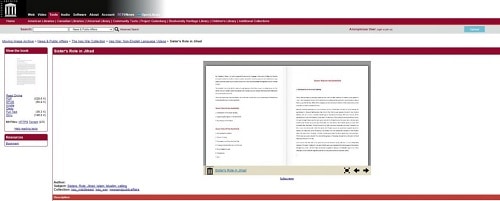
Archive.org/details/SistersRoleInJihad, accessed January 7, 2015
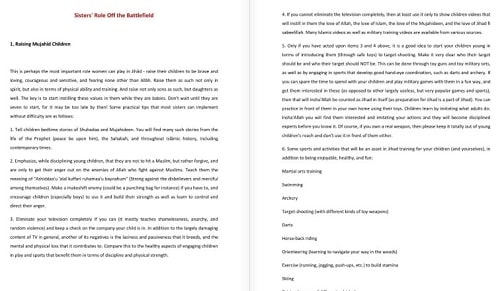
Archive.org/stream/SistersRoleInJihad/78644461-Sister-s-Role-in-Jihad#page/n5/mode/2up, accessed January 7, 2015.

A militant practices horseback riding and shooting
A video released by Al-Qaeda in the Indian Subcontinent (AQIS) gives details of the jailbreak operation carried out by the Taliban on July 29, 2013 to free prisoners from the Dera Ismail Khan prison in Pakistan. More than 250 prisoners, including a dozen top militants, escaped during the jailbreak. In the video, AQIS leader Maulana Asim Umar further vows to free prisoners around the world.
Pakistani Taliban Commander Ehsanullah Ehsan Remains Active On LinkedIn.com Despite Media Exposure

A snapshot of Ehsanullah Ehsan's account on LinkedIn (taken on January 6, 2015)
Two days after being exposed by the media, Pakistani Taliban commander Ehsanullah Ehsan's account on social networking site LinkedIn remains active.


